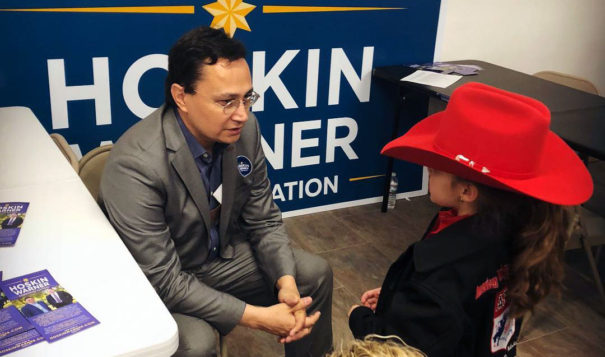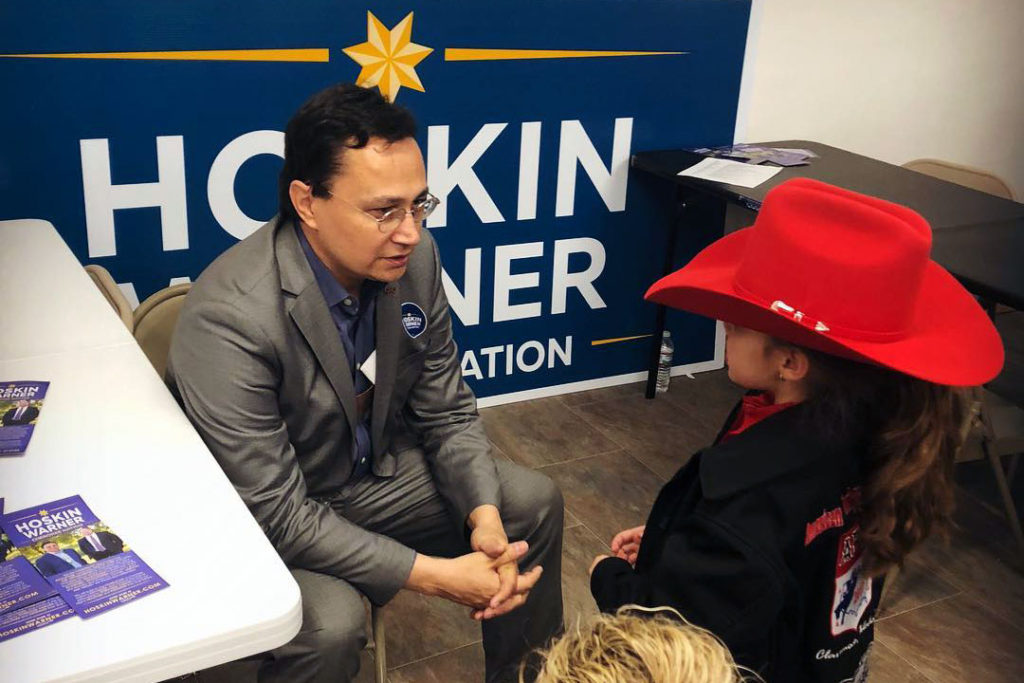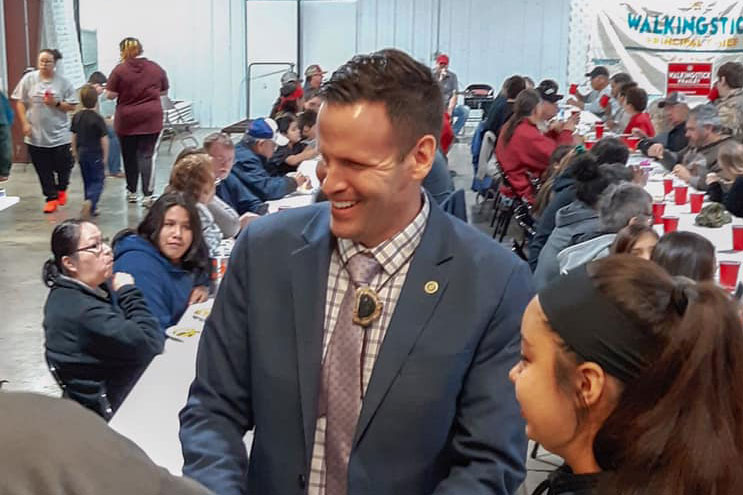News Article Article pages that do not meet specifications for other Trust Project Type of Work labels and also do not fit within the general news category.
Cherokee Nation’s next chief will have a big footprint in Indian Country

Saturday’s election in the largest Native American tribe could shape policy and law in tribal communities across the country.
Members of the Cherokee Nation — the largest Native American tribe — will cast votes for a new principal chief this week from every corner of the United States. With nearly 229,000 of the nation’s 370,000 living outside the 14 counties in eastern Oklahoma that comprise tribal lands, voters will send their ballots from major cities like Los Angeles and Washington, D.C., as well as the Colorado Rockies and the rolling hills of Georgia. Countless others will vote by mail from military bases in foreign countries.
The Cherokee Nation has always played an outsized role in dealing with the U.S. government and its various presidents, politicians and policymakers, beginning with Chief John Ross, who tirelessly lobbied President Andrew Jackson and Congress to stop the Trail of Tears. Federal Indian law experts say the amount of time and resources the Nation has put into fighting for tribal sovereignty and autonomy is incalculable, and whoever wins the current race will be one of the country’s most prominent advocates for Native American interests.
On Saturday, many Cherokee citizens will likely be less concerned with which candidate’s political values reflect their own than with who will be the most effective representative for Indigenous people on the national stage. They will also consider issues like access to health care and the protection of tribal water systems and tribal citizens, as well as the candidate’s experience in understanding and advocating for Indigenous interests.

Courtesy of Hoskin for Chief
The Cherokee Nation’s role, and by extension its chief’s, in upholding sovereignty in court can impact tribes across the country. The nation is often seen as the “tip of the legal spear,” said Cherokee Nation Attorney General Todd Hembree, referring to the tribe’s lawsuit against opioid distributors and its efforts to protect religious and cultural rights and the Indian Child Welfare Act (ICWA). With a Texas court recently striking down ICWA as unconstitutional, the Cherokee Nation’s ongoing defense of the act has major importance for tribal interests nationwide. “If you’re a tiny tribe in Oklahoma, you’re not going to have the legal resources to argue nationally to protect children,” said C. Steven Hager, a lawyer with Oklahoma Indian Legal Services. “So it’s not just Cherokee children that the Cherokee Nation protects, it’s Indian children all across this country.”
The current chief, Bill John Baker, saw fighting legal and philosophical challenges to ICWA as an administrative priority. Whether or not that policy continues will be decided by voters Saturday. “What is (the Cherokee Nation’s) direction going to be?” Hager asked. “That’s going to be taken and reviewed by the other tribes.”

Courtesy of Walkingstick for Chief
While Cherokee Nation chief races are nonpartisan, this one has taken on an increasingly ideological and politically divisive tone. One candidate, David Walkingstick, even characterized it as a race between “light and darkness.” Walkingstick had been one of two frontrunners, alongside attorney and former Cherokee Nation Secretary of State Chuck Hoskin Jr., until May 17, when he was removed from the ballot for violating Cherokee Nation campaign finance law. Walkingstick painted his campaign as the David to his opponent’s well-funded Goliath, and his rural accent and right-leaning values made a good foil to Hoskin’s polished speaking points. Hoskin’s vision for the Cherokee Nation is similar to that of Chief Baker, and both descend from generations of involved Democrats.
This election is especially important to the future of the Cherokee Nation, largely because of the kind of politics Walkingstick attempted to introduce. The outside money involved in his campaign challenged the Cherokee Nation’s election laws, which were designed to prohibit the dark money campaign finance system seen in U.S. elections. Cherokee law allows campaign donations only from individuals, but the attorney general’s office charged that Walkingstick worked hand-in-hand with Cherokees for Change, an LLC that made anonymous contributions to his campaign. Cherokees for Change and Walkingstick both advocate pulling the Cherokee government out of what they see as a cozy relationship with the Democratic party. The allegations incensed many Cherokees wary of letting the practices allowed by the Supreme Court’s Citizens United decision to creep into their tribal election. Former U.N. ambassador and Cherokee Nation citizen Keith M. Harper called it “absurd” to allow “dark money” into a tribal election. “Is it within the Cherokee tradition to consider corporations formed under foreign laws to be the equivalent of Cherokee citizens when it comes to individual rights?” he wrote. “I think not.”
Despite being removed from the ballot, Walkingstick continued to rally his sizable base, asking those who voted early last weekend to vote for him even as he awaited the Cherokee Nation Supreme Court’s decision on his appeal. Tribal Councilman Dick Lay, a conservative rancher representing the tribe’s most rural district, will likely absorb most of Walkingstick’s votes, but he lacks Walkingstick’s flair for casting himself as an outsider, although both men have served on the tribal council for the last eight years. On Wednesday morning, The Cherokee Nation Supreme Court agreed with the election commission’s decision to remove Walkingstick from the ballot, concurring that he solicited unlawful campaign contributions. For now, it seems those who voted early for Walkingstick could lose their vote in the chief’s race.
Under President Donald Trump, the federal government has tried to force work requirements on tribal citizens seeking health care, dramatically shrunk protected lands important to Indigenous people, and proposed consolidating offices, and resources, in the Bureau of Indian Affairs. It’s also possible the U.S. Supreme Court will hear arguments this year involving Texas’ claim that ICWA is unconstitutional. That, as Hager notes, could be one of the most effective ways to mount a legal challenge to tribal sovereignty.
Early voting has already begun, and many of the 31,000 registered voters who live outside the tribal lands have already cast absentee ballots. Although the Cherokee Nation Election Commission reports that voter registration has steadily increased and is now just shy of 74,000, voting records show only about 20,000 Cherokees voted in the last chief’s race in 2015. The general election will take place June 1. If neither of the candidates receives a majority of votes, a run-off election will take place at the end of July.
This story was originally printed on June 29, 2019 in High Country News. It is reprinted here with permission.
